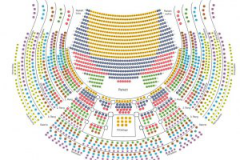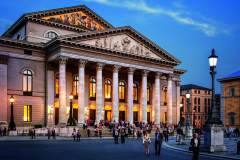Fidelio
Mo | Tu | We | Th | Fr | Sa | Su |
Opera in two acts (1814)
Coproduction with the English National Opera
recommended for 16 years and older
In German. With German and English surtitles.
Dressed as a man and calling herself “Fidelio”, Leonore surreptitiously gains the confidence of the jailer Rocco and his daughter Marzelline, thus gaining access to the high security tract where her husband Florestan has been despotically incarcerated by Don Pizarro. Florestan is in mortal danger, but this does not intimidate his wife, who is determined to liberate him. Finally, however, the two of them can only be rescued by an emissary from the monarch. At the end, a Utopia in the form of a final chorus sets the stage aglow, not only as a plea for freedom and justice, but also concurrently as a condemnation of the anxieties and restrictions of human existence.
Synopsis
Two years prior to the opening scene, the nobleman Florestan has exposed or attempted to expose certain crimes of the nobleman Pizarro. In revenge, Pizarro has secretly imprisoned Florestan in the prison over which he is governor.
The jailer of the prison, Rocco, has a daughter, Marzelline, and a servant (or assistant), Jaquino. Florestan's wife, Leonore, came to Rocco's door dressed as a boy seeking employment, and Rocco hired her.
On orders, Rocco has been giving Florestan diminishing rations until he is nearly starved to death.
Place: A Spanish state prison, a few miles from Seville
Time: Late 18th century
Act 1
Lotte Lehmann as Leonore
Jaquino and Marzelline are alone in Rocco's house. Jaquino asks Marzelline when she will agree to marry him, but she says that she will never marry him now that she has fallen in love with Fidelio. She is unaware that Fidelio is actually Leonore in disguise. ("Jetzt, Schätzchen, jetzt sind wir allein" [Now, darling, now we are alone]). Jaquino leaves, and Marzelline expresses her desire to become Fidelio's wife ("O wär ich schon mit dir vereint" [If only I were already united with thee]). Rocco enters, looking for Fidelio. Fidelio enters carrying a heavy load of newly repaired chains. Rocco compliments Fidelio, and misinterprets her modest reply as hidden attraction to his daughter. Marzelline, Leonore, Rocco, and Jaquino sing a quartet about the love Marzelline has for Fidelio ("Mir ist so wunderbar" [A wondrous feeling fills me], also known as the Canon Quartet).
Rocco tells Leonore that as soon as the governor has left for Seville, she and Marzelline can be married. He tells them, however, that unless they have money, they will not be happy. ("Hat man nicht auch Gold beineben" [If you don't have money on the side]). Leonore says that she wants something else at least as much as money: to know why Rocco will not permit her to help him in the dungeons, because he always comes back out of breath. Rocco says that there is a prison where he can never take her, and inside is a man who has wasted away for two years because of his powerful enemies. Marzelline begs her father to keep Leonore away from such a terrible sight. Instead Rocco and Leonore sing of courage ("Gut, Söhnchen, gut" [All right, son, all right]), and soon Marzelline joins in their acclamations.
All but Rocco leave. A march is played as Pizarro enters with guards. Rocco gives Pizarro a message with a warning that the minister plans a surprise visit tomorrow to investigate accusations that Pizarro is a tyrant. Pizarro exclaims that he cannot let the minister discover the imprisoned Don Florestan, who has been thought dead. Instead, Pizarro will murder Florestan ("Ha, welch ein Augenblick!" [Hah! What a moment!]). Pizarro orders that a trumpet be sounded at the minister's arrival. He offers Rocco money to kill Florestan, but Rocco refuses ("Jetzt, Alter, jetzt hat es Eile!" [Now, old man, we must hurry!]), and instead Pizarro orders him to dig a grave in the ruined well in the dungeons. When the grave is ready, Rocco should sound the alarm. Pizarro will then come disguised into the dungeon, and kill Florestan himself. Leonore has seen Pizarro plotting. She is agitated, but thoughts of her husband calm her down ("Abscheulicher! Wo eilst du hin? ... Komm, Hoffnung, lass den letzten Stern" [Scum! Where are you going? ... Come, hope, let the last star]).
Jaquino begs Marzelline to marry him, but she refuses. Leonore, hoping to find Florestan, asks Rocco to let the poor prisoners roam in the garden and enjoy the beautiful weather. Marzelline also begs him, and Rocco agrees to distract Pizarro while the prisoners are set free. The prisoners, overjoyed at their freedom, sing joyfully ("O welche Lust" [O what a joy]), but, remembering that they could be caught, are soon quiet.
Rocco reenters and tells Leonore of his success with Pizarro: Pizarro will allow the marriage, and Leonore will be permitted to join Rocco on his rounds in the dungeon ("Nun sprecht, wie ging's?" [Speak, how did it go?]). They prepare to go to the cell of a prisoner who, says Rocco, must be killed and buried within the hour. Leonore is so shaken that Rocco tries to persuade her to stay behind, but she insists on coming. As they prepare to leave, Jaquino and Marzelline rush in and tell Rocco to run: Pizarro has learned that the prisoners are free, and he is furious ("Ach, Vater, Vater, eilt!" [O, father, father, hurry!]).
Before they can move, Pizarro enters and demands an explanation. Rocco pretends that they are celebrating the King's naming day, and suggests quietly that Pizarro save his anger for the prisoner in the dungeons below. Pizarro tells him to hurry and dig the grave, then announces that the prisoners will be shut in again. Rocco, Leonore, Jacquino, and Marzelline reluctantly usher the prisoners back to their cells. ("Leb wohl, du warmes Sonnenlicht" [Adieu, warm sunshine]).
Act 2
Rocco (Wilhelm Schirp) and Marzelline (Irma Beilke); September 1945, Deutsche Oper Berlin
Florestan is alone in his cell, deep inside the dungeons. He sings first of his trust in God, then has a vision of Leonore coming to save him ("Gott! Welch Dunkel hier!" [God! What darkness here]... "In des Lebens Frühlingstagen" [In the spring days of life]). He collapses and falls asleep. Rocco and Leonore come to dig his grave and find him asleep. As they dig Rocco urges Leonore to hurry ("Wie kalt ist es in diesem unterirdischen Gewölbe!" [How cold it is in this underground chamber] ... "Nur hurtig fort, nur frisch gegraben" [Come get to work and dig!]). This is the Gravedigging Duet.
Florestan awakes and Leonore recognizes him. When Florestan learns at last that he is in Pizarro's prison, he asks that a message be sent to his wife, Leonore Florestan, but Rocco says it is impossible. Florestan begs for a drop to drink, and Rocco tells Leonore to give him one. Florestan does not recognize Leonore but tells her she will be rewarded in Heaven ("Euch werde Lohn in bessern Welten" [You shall be rewarded in better worlds]). She begs Rocco to be allowed to give Florestan a crust of bread, and he agrees. Florestan eats.
Rocco obeys his orders and sounds the alarm for Pizarro, who appears and asks if all is ready. Rocco says that it is and tells Leonore to leave, but instead she hides. Pizarro reveals his identity to Florestan, who accuses him of murder ("Er sterbe! Doch er soll erst wissen" [Let him die! But first he should know]). As Pizarro brandishes a dagger, Leonore leaps between him and Florestan and reveals her identity. Pizarro raises his dagger to kill her but she pulls a gun and threatens to shoot him.
Just then the trumpet is heard, announcing the arrival of the minister. Jaquino enters, followed by soldiers, to announce that the minister is waiting at the gate. Rocco tells the soldiers to escort Governor Pizarro upstairs. Florestan and Leonore sing to their victory as Pizarro declares he will have revenge, and Rocco expresses his fear of what is to come ("Es schlägt der Rache Stunde" [Revenge's bell tolls]). Together, Florestan and Leonore sing a love duet ("O namenlose Freude!" [O unnamed joy!]).
Here overture "Leonore No. 3" is sometimes played.
The prisoners and townsfolk sing to the day and hour of justice which has come ("Heil sei dem Tag!" [Hail to the day!]). The minister, Don Fernando, announces that tyranny has ended. Rocco enters, with Leonore and Florestan, and he asks Don Fernando to help them ("Wohlan, so helfet! Helft den Armen!" [So help! Help the poor ones!]). Rocco explains how Leonore disguised herself as Fidelio to save her husband. Marzelline is shocked. Rocco describes Pizarro's murder plot, and Pizarro is led away to prison. Florestan is released from his chains by Leonore, and the crowd sings the praises of Leonore, the loyal savior of her husband ("Wer ein holdes Weib errungen" [Who has got a good wife]).
Program and cast
Duration est. 2 hours 50 minutes
Conductor: Yoel Gamzou
Director: Calixto Bieito
Stage Designer: Rebecca Ringst
Costume Designer: Ingo Krügler
Lighting: Reinhard Traub
Assistant Choreographer: Heidi Aemisegger
Dramaturge: Andrea Schönhofer
Chorus: Christoph Heil
Don Fernando: Alexander Grassauer
Don Pizarro: Josef Wagner
Florestan: Benjamin Bruns
Leonore: Johanni van Oostrum
Rocco: René Pape
Marzelline: Mirjam Mesak
Jaquino: Caspar Singh
1.Gefangener: Dafydd Jones
2.Gefangener: Paweł Horodyski
Bayerisches Staatsorchester
Chorus of the Bayerische Staatsoper
National Theatre Munich
The National Theatre Munich (German: Nationaltheater München) is an opera house in Max-Joseph-Platz in Munich, Germany. It is the home of the Bavarian State Opera and the Bayerisches Staatsballett(Bavarian State Ballet).
The Bavarian State Opera also performs in the Prinzregententheater, which opened in 1901 and, like the Bayreuth Festspielhaus, is built to Richard Wagner's specifications, and in the Cuvilliés Theatre at the Residenz, constructed in 1751–1753 and described by Thierry Beauvert as "a Rococo gem".
The Nationaltheater is very easy to get to both by car and by MVV public transportation.
By MVV public transportation
S-Bahn: S 1 - 8 Marienplatz
U-Bahn: U 3, 6 Marienplatz, U 3 - 6 Odeonsplatz
Bus: 52, 131 Marienplatz, 100 Odeonsplatz
Straßenbahn: 19 Nationaltheater
On the day of the performance, holders of regular tickets are entitled to use public transport provided by the Münchner Verkehrsverbund (MVV). This service starts at 3 pm respectively three hours before the performance commences and ends with the closing hour of the MVV.
By Car
Take the Altstadt-Ring to Maximilianstraße.
Parking garage Max-Joseph-Platz: open Monday to Sunday from 6:00 A.M. to 2:00 A.M.
You can take advantage of the special theatre parking fee of Euro 10,- from 6:00 P.M. to 8:00 A.M. by presenting your admission tickets.

 EN
EN DE
DE IT
IT FR
FR ES
ES RU
RU JP
JP RO
RO
 Seating plan
Seating plan 